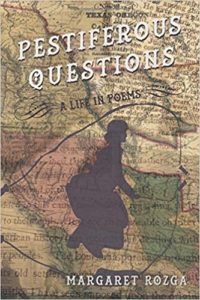 Review by Barbara Ellen Sorensen
Review by Barbara Ellen Sorensen
The final poem in Margaret Rozga’s book of poems Pestiferous Questions titled “Why Jessie?” warns, “History is a timeline / Those who do not know history / leave it lying underfoot / We trip on it again and again” (117). These lines predict a pestiferous thorn in our collective side and Rozga extracts the sharp encumbrance, delicately placing it under a near-blinding magnifying glass. As individuals in a society that has always been multicultural (to the chagrin of white nationalists who have made their stubborn persistence violently and recently known), it seems, as readers, we need this pointed reminder. History is not always pleasant or palatable and if not heeded is at once easily tripped over.
This work goes deeper than descriptive or emotional writing. This is poetry less concerned with emotive ideas or thoughts, but rather in the act of revealing a 19th century woman’s life in “the simplest sentences” (63). Poet/historian Rozga must “dig like crazy” (23) to unearth a herstory that is persistent and prickly, and as she checks her subject to find “in what agitated waters swim her syntactic swans” (63), she finds deep and turbulent waters, indeed.
Manifest destiny is a particular value that is woven into many of the persona poems. An attitude that denied any woman a place in it, manifest destiny was a considerable force in the religious and social fabric of the 19th century. This attitude espoused the idea that America was righteous and blessed. Settlers could press further and further into expanding their immediate landscape and dismiss any and all whom they came into contact with. This attitude gave settlers a perceived permission to push aside Native Americans and start a war with Mexico that has never truly been resolved. Jessie fought back using her talent for crafting stories and shaped a history characterized through female eyes and declared, “Destiny is never manifest. / It’s made out of words” (44). Many verses resonate with the idea that once women realize they can “create paths with…words,” (49) everything becomes sacred and nothing remains hidden. In responding to the inevitable question of “Why Jessie?” (38), Rozga answers, “I feel an understory stirring, churning. / I follow the tangled plots / across a continent of / pestiferous questions” (38).
It is women who must have “manifest courage” (59), must realize together “the slavery question seemed part of the landscape” (60), and it is they who must therefore affirm “I would as soon place my children / in the midst of smallpox; as rear them / under the influence of slavery” (60).
Ultimately, a predominantly white male history leaves us all so oppressed we desperately need Jessie’s vision and thankfully, she comes through:
I write even when I / doubt words, when the night is / distant clouds against distant sky. / I write dark against dark. I / am the night sun moving in smooth/uncounted hours, the past becoming a place / I write. / I free myself from time” (99).
Through Rozga’s elegant and spare writing, the reader can hear Jessie, our luminous guide, telling us from some distant shore what history really emulates: an angel to awaken the sleeping, or the dead:
“History is a meandering river, different / from the line that represents it on a map. / See a meeting of streams, the placid / Ohio giving way to the muddy Mississippi, / already conjoined with Missouri. / Those who don’t know history / are destined to repeat…Repeat: / those who know history see exactly / how we live on its flood plain.” (114).
Barbara Ellen Sorensen is a poet and writer. She contributes to the Tribal College Journal and has two poetry publications: Song From the Deep Middle Brain (Main Street Rag, 2010) and Compositions of the Dead Playing Flutes (Able Muse Press, 2013).
